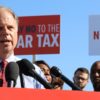The fight for control of the Alabama Democratic Party is going back to Montgomery County Circuit Court.
The Alabama Supreme Court on New Year’s Eve dismissed an appeal related to the jurisdiction of the case in which Nancy Worley, the former head of the Alabama Democratic Party, filed a lawsuit in an attempt to stop a reform group from seizing control of the party. That dismissal will send the case back to Montgomery Judge Greg Griffin’s court, where the two sides will attempt to settle the matter or head back to the ALSC.
Attorney Barry Ragsdale, who represents new ADP chairman Chris England and the rest of the reform group, said his clients plan to ask Griffin to dismiss the case outright.
It is unlikely, given his past questionable rulings, that Griffin would entertain such a motion.
When Worley originally filed suit, she asked the court to issue a temporary restraining order blocking the reform caucus from holding a meeting in which it planned to elect new ADP leadership. The meeting was scheduled for a Saturday. The hearing in which Worley asked for the TRO was on a Thursday.
Griffin waited until 4:59 p.m. on Friday to submit his ruling, in an apparent attempt to block the reform caucus and its attorneys from appealing the ruling to the ALSC.
The move didn’t work.
The ALSC issued an emergency stay of Griffin’s order later that night and the reform caucus elected Chris England as chair and Patricia Todd as vice-chair the following day. The Democratic National Committee then placed its support behind England, Todd and the reform party and has recognized it as the true ADP.
Last month, England — not Worley — certified candidates for office for the upcoming elections in Alabama, and Alabama Secretary of State John Merrill indicated he viewed England as the head of the party.
Still, though, the lawsuit lingers.
That lawsuit centers around the DNC’s authority to require the ADP to adopt new bylaws that expand the definition of minority members. The national party long ago began recognizing several groups as part of its “minority” definition, but the ADP was slow to change and mostly filled its minority caucus with only black members.
Reed, who is the vice chairman for minority affairs and the executive director of the Alabama Democratic Conference, maintained that that was their right under a consent decree issued by a federal judge in the early 1990s.
However, that decree required only that black members of the State Democratic Executive Committee, which elects ADP leadership, be equal to or greater than the percentage of black voters in the state. That guidance often left Reed handpicking dozens of SDEC members just prior to a leadership vote, and those handpicked members shifting the vote to favor Reed’s candidate of choice.
The new bylaws demanded by the DNC added significantly more members to the minority caucus — and in fact ended up creating a new minority caucus — which brought ADP in line with the national bylaws and also dramatically weakened Reed’s hold on the SDEC.
Worley and vice-chair Randy Kelly resisted those changes for months, until the DNC was forced to revoke their credentials and threaten not to seat ADP delegates at next summer’s national conference.
Finally, the reform caucus, led by U.S. Sen. Doug Jones, stepped in and submitted new bylaws and essentially formed a new ADP, with many of the old members and dozens of new members. The DNC tossed its support behind the reform group and at the November meeting, new SDEC members were seated and new leadership elected. The new bylaws, which kept intact the requirement that black SDEC membership equal state voting percentages, were adopted as well.
At this point, there seems to be little chance for the Worley faction to win the lawsuit, and even if it somehow prevailed, it’s unclear what it would do to regain control. An entirely new party has been formed at this point, and the DNC, with its national resources, has backed the England-led group.



















































